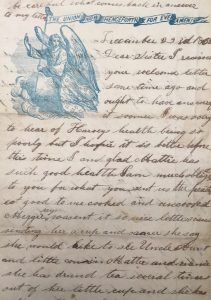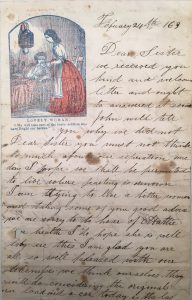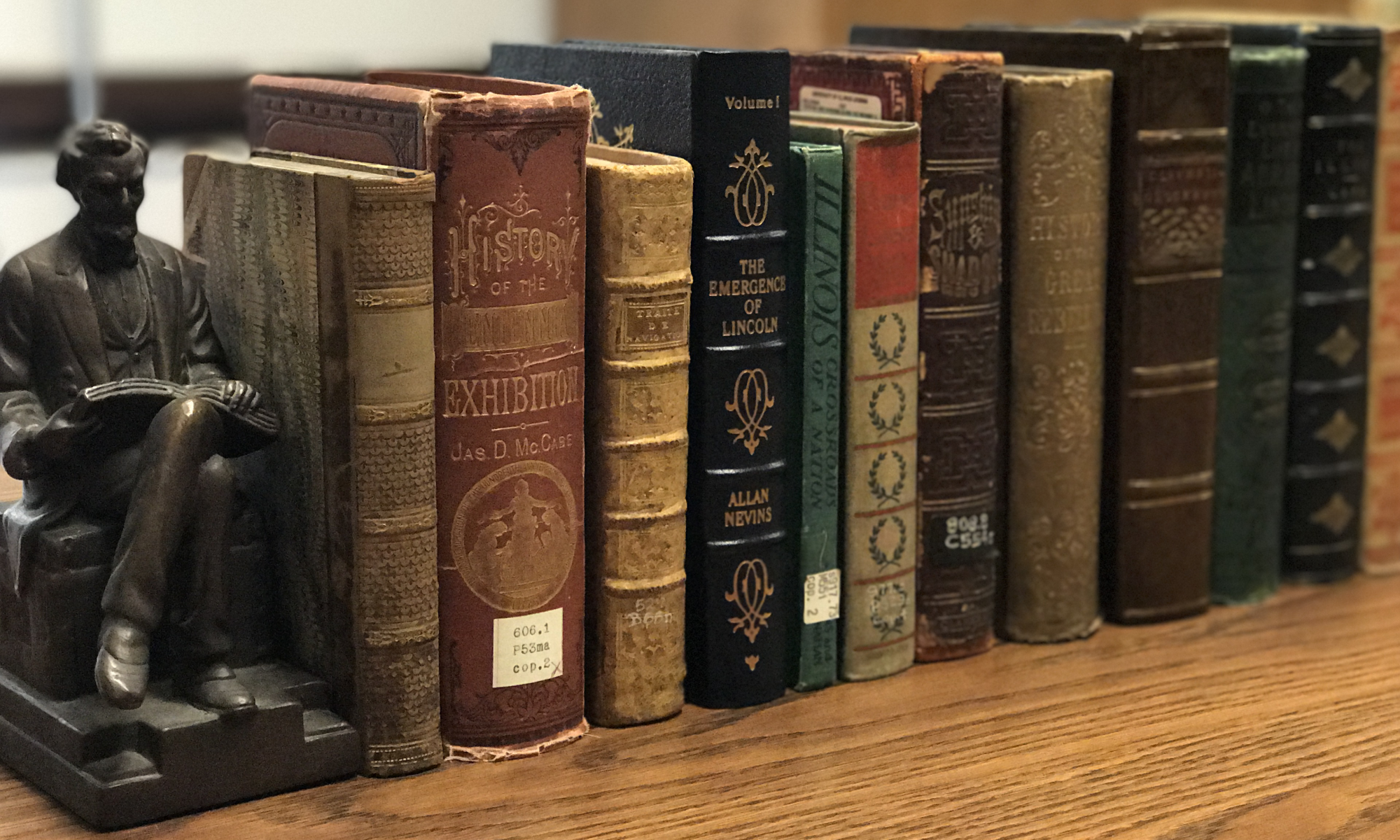 The Knight Family Correspondence are a collection of letters that document the lives of the Knight and Mack families, connected by sisters Martha and Isabella Gill, who settled in Illinois in the second half of the 19th century. Martha and Isabella Gill were born in Ireland; the sisters were orphaned but later moved to the United States with aunts and uncles. Isabella married Harvey J. Knight in 1853 and the couple gave birth to a daughter, Martha “Mattie” Knight, the following year. They had another daughter, Anna Knight, in 1856. Most of the letters in the first half of the collection are from Martha and Isabella as they each settle into their lives in Illinois. The later letters center around Isabella’s daughters, Mattie and Anna, and their careers as teachers. The letters in this collection primarily pertain to the family’s health and wellbeing, farm life, and school. Many of the letters use minimal punctuation or capitalization and contain spelling errors.
The Knight Family Correspondence are a collection of letters that document the lives of the Knight and Mack families, connected by sisters Martha and Isabella Gill, who settled in Illinois in the second half of the 19th century. Martha and Isabella Gill were born in Ireland; the sisters were orphaned but later moved to the United States with aunts and uncles. Isabella married Harvey J. Knight in 1853 and the couple gave birth to a daughter, Martha “Mattie” Knight, the following year. They had another daughter, Anna Knight, in 1856. Most of the letters in the first half of the collection are from Martha and Isabella as they each settle into their lives in Illinois. The later letters center around Isabella’s daughters, Mattie and Anna, and their careers as teachers. The letters in this collection primarily pertain to the family’s health and wellbeing, farm life, and school. Many of the letters use minimal punctuation or capitalization and contain spelling errors.
On September 18, 1855, Martha wrote to Isabella that she planned to move from Newton, Iowa, to Bloomington, Illinois, in the fall after their Uncle John rented a house there. In June of 1856 Martha wrote to Isabella saying, “Uncle has got his new house done and he has two teams of oxen breaking prarie [sic] one hired and one his own and has got a good deal of fencing done he has nearly one hundred and fifty head of cattle.”
Martha Gill married John Mack on Christmas Day in 1855 and the couple moved to Towanda soon after, which was not far from Bloomington and still near family. Martha frequently asked Isabella and Harvey to move from Ohio and to join them, suggesting that they would be much happier and do well living closer to friends and family. In a letter to Isabella in 1857 Martha described farm life in Illinois:
I believe I never told you anything about how we have our farm filed away out here on the great praries [sic] of Illinois first I will tell you how our farming crops are growing our spring wheat is out in heat the fall wheat being all killed last winter the corn would average about a foot high we have had a very backward spring we have got some nice looking potatoes growing fit to make any irish woman laugh we eat the last of our old potatoes yesterday and had new ones today.
Martha went on later in the letter to tell Isabella, “When you write tell us if you and Harvey is getting ready to come and live next neighbors to us people is fencing and improving farms all arounds us.”
 Many midwestern states, including Illinois, experienced rapid population growth throughout the 19th century with increased migration. Illinois’s population doubled between 1850 and 1860, and it doubled again by 1880. In 1866, Harvey moved to Towanda with his sheep and established his land and farm before his family joined him the next year. He wrote to his brother Thomas on November 11, 1867 saying that he had been “very busily engaged” since he left Ohio. He wrote, “I have bought sixty three acres of land about two miles northwest from Bloomington and about the same distance normal university in Normal town Mattie is going to the Moddel School in Normal she goes on horse back and she is learning well and she like to go very much.”
Many midwestern states, including Illinois, experienced rapid population growth throughout the 19th century with increased migration. Illinois’s population doubled between 1850 and 1860, and it doubled again by 1880. In 1866, Harvey moved to Towanda with his sheep and established his land and farm before his family joined him the next year. He wrote to his brother Thomas on November 11, 1867 saying that he had been “very busily engaged” since he left Ohio. He wrote, “I have bought sixty three acres of land about two miles northwest from Bloomington and about the same distance normal university in Normal town Mattie is going to the Moddel School in Normal she goes on horse back and she is learning well and she like to go very much.”
Mattie also wrote to her Uncle Thomas the next year describing her happiness with the move, saying, “Uncle I think we live in a very pretty place. I wish you could hich [sic] old Sam in your buggy and come and see us some day and go to school with us and drive around the country and see it.”
Isabella wrote to Thomas around the same to express her satisfaction with the move and life in Illinois as well:
Harvey has made the remark several times this spring that he felt better than he had done for 15 or 20 years my own health was poor for about a year after we came out here but I am well now. the children are both well Mattie is growing very fast she is some taller than I am Annie does not seem to grow much she does not look any larger than when we left Ohio. O Tommy we have such a nice country. I wish you would come out this summer and see us. Bloomington and Normal are improveing [sic] so much.
By the end of 1874 Mattie was teaching at a school in Camargo, a village in Douglas County, Illinois. In the mid-1800s many schoolteachers were educated, unmarried women, and the work offered them a salary and a certain degree of independence. By 1879 Anna was teaching as well. She remained near Normal, although in July of 1878 she had received an offer from a friend for a teaching position in Fort Smith, Arkansas, that would have paid $40 a month for a term of ten months. The collection includes a number of letters from the two sisters, particularly Mattie, to their mother and one another with news of teachers meetings, comments on school, and updates on their teaching. Both sisters continued to teach at least through 1888; the final letter within this collection of correspondence is dated 1888, at which point Mattie and Anna were still employed as teachers.
Check out the Knight Family Correspondence, 1853-1888 (MS 041) to learn more about the lives of the Mack and Knight families and their experiences settling into life in Illinois.
Other Resources
Cordier, Mary Hurlbut. “Prairie Schoolwomen, Mid-1850s to 1920s, in Iowa, Kansas, and Nebraska.” Great Plains Quarterly, 1988. http://search.ebscohost.com/login.aspx?direct=true&db=edsjsr&AN=edsjsr.23530768&site=eds-live&scope=site
Emery, Tom. “Immigrants were plentiful in early Illinois.” Quad-City Times, July 4, 2015. https://qconline.com/news/illinois/immigrants-were-plentiful-in-early-illinois/article_f44e6758-6441-5cc9-bd57-e6fbd7eac5d9.html
Hartman, Dorothy W. “Lives of Women.” Conner Prairie. Retrieved September 20, 2019. https://www.connerprairie.org/educate/indiana-history/lives-of-women/
“Illinois Migration History 1850-2010.” America’s Great Migration Project, University of Washington. Retrieved September 20, 2019. http://depts.washington.edu/moving1/Illinois.shtml
